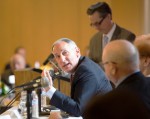Amid recent controversial events that have affected the Jewish community, prominent Jewish scholars and leaders convened at UCLA on Sunday to discuss how these issues would affect college students across the country.
The panel members included Mark Yudof, former president of the University of California and UC Berkeley law professor, Eric Fingerhut, president and CEO of Hillel International, and Deborah Lipstadt, Emory University professor of modern Jewish history and Holocaust studies. David Myers, chair of theUCLA history department and professor of Jewish history, moderated the panel.
The event marked Yudof’s first visit to UCLA since he stepped down as UC President in August.
UCLA Hillel – a group that engages Jewish students in cultural and civic activities – organized the event to honor donors who financially support the ongoing programs at Hillel, said Rabbi Chaim Seidler-Feller, executive director of UCLA Hillel. Hillel International is an umbrella organization with locations at universities across the country.
One main topic of discussion was the American Studies Association’s recent call for scholars to dissociate themselves with Israeli universities in an academic boycott. Myers asked the panelists whether or not the association’s actions are anti-Semitic, legitimate or a combination of both.
Lipstadt said she thinks the boycott movement is a mix of “all of the above,” and that in certain cases, people who support the boycott think it is the most viable method of changing Israeli policies.
Yudof said he partially agreed with Lipstadt, but he also said the movement is “disgraceful,” and he’s worried some individuals may find the boycott movement appealing.
Fingerhut said the boycott worried him because it arose from different non-political organizations of the scholarly community that are not directly related to Israel.
The panelists also discussed how the Hillel chapter at Swarthmore College in Pennsylvania recently decided to allow all students to join its organization, even if they have anti-Zionist beliefs.
Zionists advocate for Jewish sovereignty in the region contested by Israelis and Palestinians, while anti-Zionists oppose this viewpoint.
Yudof said that as a private group, Swarthmore’s Hillel doesn’t necessarily have to include everyone in its membership.
“It is not automatic that an organization – a private organization – has to bring in dissident voices. It can. I want to make this clear … but it doesn’t have to,” Yudof said.
Fingerhut, who sent a letter last month to Swarthmore Hillel disagreeing with its decision, was the panel member who was most vocal about his opposition to the change. He said the organization might not have done this if they had a professional staff like many other Hillel organizations.
After the panel, students expressed their own thoughts about how students are reacting to recent debates about Israel.
Yvonne Winer, a second-year history student and president of the Olive Tree Initiative, said she thinks many Jewish students she knows are open to hearing differing perspectives on contentious topics.
“With Israeli politics or the Israeli-Palestinian conflict, a lot of the younger generation wants to hear different perspectives and be able to think critically and debate them,” Winer added.
Other students said they agreed with certain points brought up by panel members, including the idea that Jewish people should be optimistic about their futures, despite these controversial issues.

I am still amazed that we are not discussing the atrocities and discriminatory practices of the Israeli government against the Palestinians who lived in Israel before the mass migration of the Jewish community. Just like South Africa, there are injustices committed by the current government against the Palestinians.
We need panels to address these issues. We need to boycott investments and divest what we already have with Israel until these injustices are addressed. As a Jewish citizen of the US I am ASHAMED of how we support Israel and how our support has adversely affected a minority population of that country.
Calling for a boycott is NOT anti-Semitic, it is pro-equality and anti-discrimination.